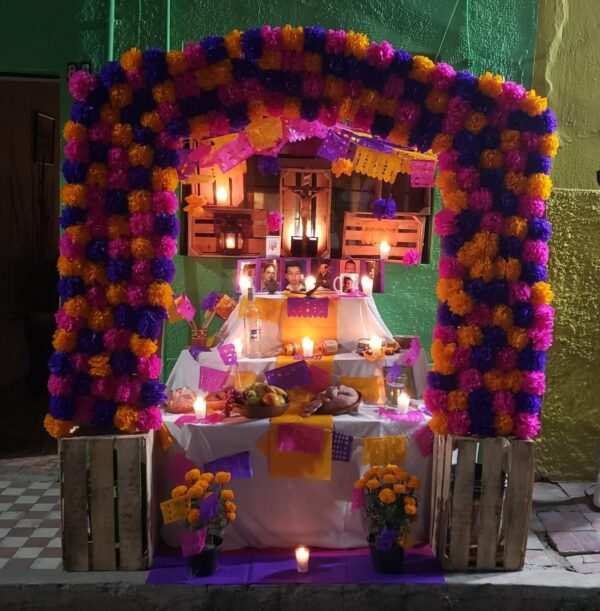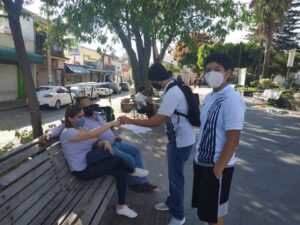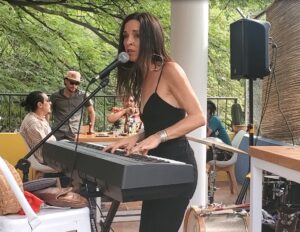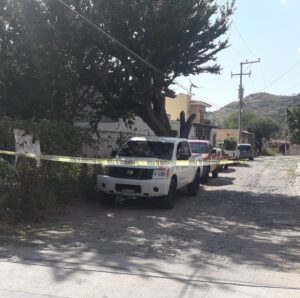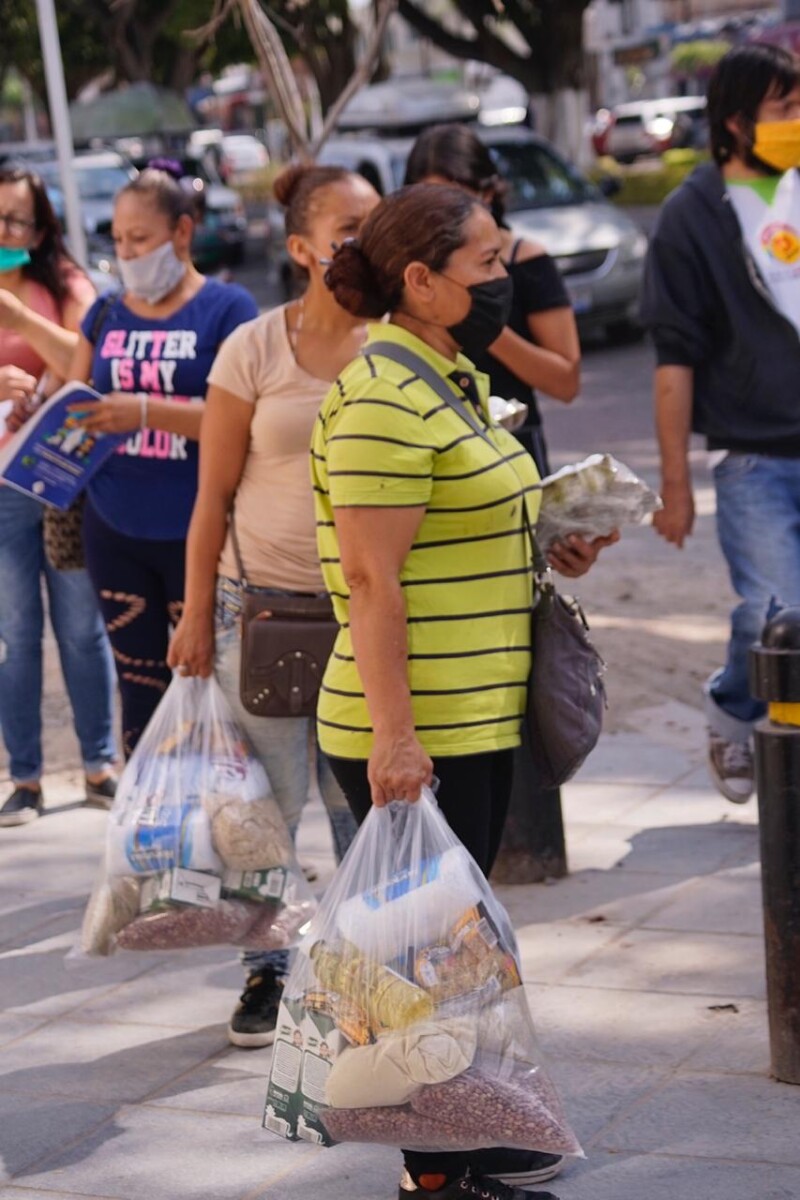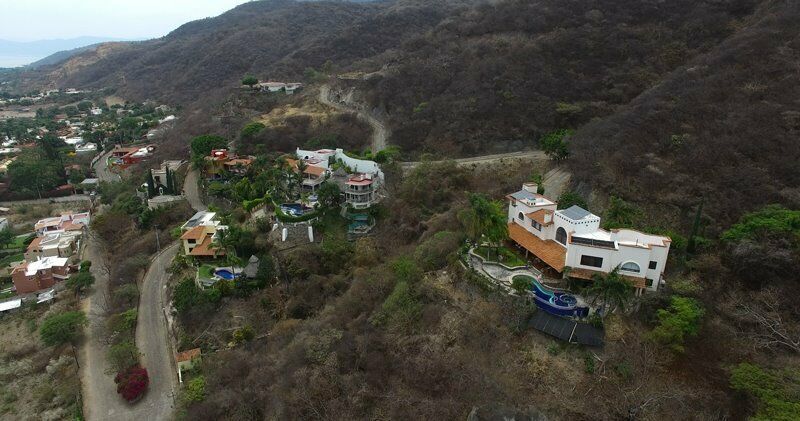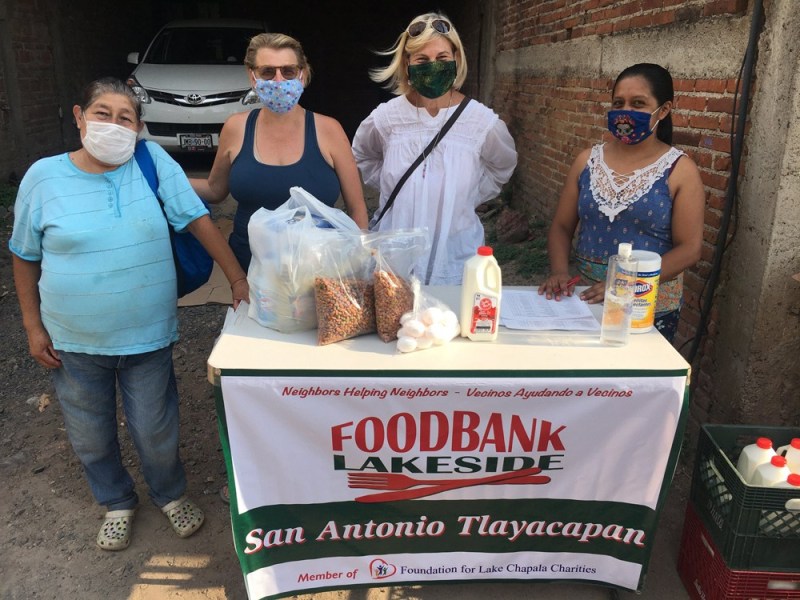Ajijic
Ajijic lució sus altares de muertos pese a que los panteones estuvieron cerrados
Los panteones cerrados no impidieron que las personas de Ajijic recordaran a sus seres queridos a través de los distintos altares que se elaboraron. Foto: Luilli Varón
Sofía Medeles.- Pese a la actual contingencia y el recién activado «botón de emergencia» con el que se han cerrado los panteones, pobladores de Ajijic decidieron sacar a relucir sus tradiciones a las calles, donde varias familias participaron colocando altares de muertos afuera de sus casas.
Independientemente de la situación económica de las familias, en sus ofrendas destacó la creatividad y el cariño hacia sus difuntos, por lo que la festividad se realizó desde sus hogares y no en los panteones como en otros años.
A continuación te presentamos algunas de las muestras de altares que se apreciaron por las calles de la delegación.
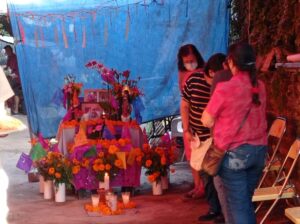
Las personas rezaban plegarias en torno a sus altares para sus seres queridos, como ocurrió en la calle Aquiles Serdán. Foto: D. Arturo Ortega.
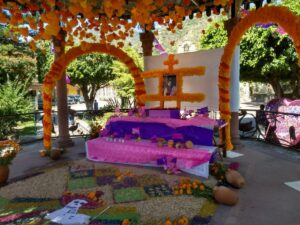
En el kiosco de la plaza, también se erigió un colorido altar. Foto: Sofía Medeles.
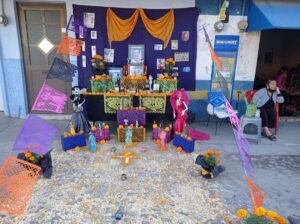
Algunos altares fueron puestos desde el sábado 31 de octubre, como éste que se ubicó en la calle Ocampo. Foto: D. Arturo Ortega.
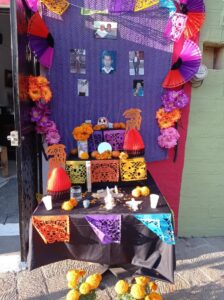
Muestra de altar en la plazoleta de las seis esquinas en Ajijic. Foto: D. Arturo Ortega.
Logran que participen más de tres mil en defensa de sus cerros y ríos
Jóvenes del CETAC recaudando folios en la plaza principal de Ajijic. Foto: cortesía.
Sofía Medeles (Ajijic, Jal).- Las ciudadanos que se organizaron para defender cerros y ríos contra la invasión inmobiliaria, han logrado subir al sitio web de la Secretaría de Medio Ambiente y Desarrollo Territorial (SEMADET) (que es el medio que se dispuso para que los pueblos opinaran acerca del desarrollo territorial de su municipio), un total de 3 mil 500 firmas, de acuerdo a información proporcionada por Julio Carmona, del grupo Ajijic Junta Vecinal y por el maestro de Bernabé Robledo del Centro de Estudios Tecnológicos en Aguas Continentales (CETAC), que apoyó en la recolección de rúbricas al grupo de Diego Medeles y Paola de Watterlot.
Los promotores también han festejado que la consulta se haya extendido hasta el lunes 23 de noviembre a consecuencia de la nutrida participación de los pobladores de los municipios de Chapala y Jocotepec.
De las 3 mil 500 firmas, el grupo de Diego y Paola, apoyado por el maestro del CETAC Bernabé Robledo, logró reunir tres mil rúbricas.

«Fue un trabajo de aproximadamente un mes, donde alumnos del plantel ayudaron voluntariamente a recolectar las firmas, a capturar folios con la petición en la página de SEMADET y a ayudarnos en los eventos», informó el maestro Bernabé. Las 500 restantes son trabajo de Julio Carmona y el grupo Ajijic Junta Vecinal, que desde un principio alzó la voz en defensa de las áreas verdes.
Tanto Julio Carmona como el maestro Bernabé, manifestaron que la participación superó las expectativas, además de resaltar que este tipo de acciones unen al pueblo y deja ver el interés local por sus reservas naturales.
Por su parte, el maestro Bernabé platicó continuará con la recolección de folios para seguir apoyando la iniciativa. «Nos vamos a dar un pequeño descanso, para después continuar con los eventos y con la junta de firmas, y nos alegra que el tiempo se haya extendido, así tenemos todavía más posibilidades de que SEMADET sepa que nos interesan nuestras montañas», recalcó el docente.
El activista, Julio Carmona, continuará con su labor de recolección de firmas, ya que en poblaciones como San Juan Cosalá y Santa Cruz de la Soledad, no tenían conocimiento de la consulta, a causa de que la SEMADET no la difundió de manera presencial sino por medio de su portal web.
«En San Juan no había nada DE información, así que me alegra que la prórroga se haya concedido, ya que así a ellos les da tiempo de meter sus observaciones para que no les pase lo que pasó con Ajijic, igual me gustaría que lo mismo fuera para pueblos como Santa Cruz de la Soledad, donde también es común ese tipo de atropellos», sentenció Carmona.
Finalmente, Julio explicó que a causa de la emergencia sanitaria la forma de recolección de firmas no se hará de manera presencial sino por internet. «Tendré que hacerlo de forma online, con videos explicativos y publicaciones, ya que esto de la pandemia nos retrasa un poquito a la hora de difundir la información, sin embargo siempre hay maneras”, informó el entrevistado.
Lakeside music and the “Red Button”
Dharma’s on the Ajijic Malecon will have to discontinue its popular Sunday afternoon concerts, like this one last week with Lete Gibney.
Patrick O’Heffernan, Ajijic. Governor Alfaro of Jalisco pushed the red button Wednesday with an announcement on the state’s website https://botondeemergencia.jalisco.gob.mx/. The restrictions will last for 14 days but may be extended if Covid cases don’t level off. Practically this means his measure will take effect throughout the state of Jalisco as of Friday, October 30 and last until Friday, November 13. During two included weekends there will be a stoppage of activities from 6:00 in the morning on Saturday and until 5:59 in the morning the following Monday.
The website lists events that can and can’t be held, times that events and restaurants and other establishments can be open, and protocols required. The restrictions vary somewhat with the location – different rules apply in Chapala and Puerto Vallarta– but in general, commercial activities must close by 7 on weekdays and cannot continue on weekends. This includes restaurants bars, buses, and private social events. (our thanks to Kerry Watson of Chapala Health Talk Facebook group for her excellent reporting on the announcement)

In Chapala (including Riberas, San Antonio, Ajijic, etc), the main areas and activities that will be shut down during restricted hours include plazas, the Lakeside malecons, public markets and tianguis ,flea markets and organic markets, sports areas/teams and urban forests, religious ceremonies and meetings of more than 10 people, and open or closed event centers.
This will be a blow to the restaurant and entertainment sector in Lakeside, but the impact will vary. Laguna conducted a nonscientific telephone survey of music venues to get an idea of how they plan to respond to the two week-long – and possibly longer – red button restrictions. In general, many venue owners looked for ways to continue providing live music. These efforts ranged from concerts at Casa Domenech from 5 -7 on the nights its is open – Monday, Tuesday, Thursday and Fri, to Adelita’s in San Antonio Tlaycapan which will offer music only one night a week, on Thursdays.
Venues like Gossips that only had music on weekends, will eliminate music for the red button period. Others like Meraki’s will continue their weekday music schedule, but just move it earlier, to 4 pm to 5 or so. Meraki’s has the flexibility to move its music completely outside, which it will do, to insure social distancing, an option not available to all venues.
Some venues will have to postpone live music, but will draw business with open mic nights, like La Bodega . The venue hopes a 25% discount on drinks will make up for business lost because of the lack of live music.
Dharma’s may be the local venue most impacted because it is the only music and food venue on the Ajijic Malecon and will lose its popular Sunday afternoon concerts, although it will offer music on Wednesday nights.

Owner, Ayrton Adrian lamented the impact of the closure of the Malecon, saying. “yes, this will totally hurt business. We are the only place on the Malecon with music. Shutting down from the Malecon will hurt us, especially because we will lose our weekend business. We will alert your customers that we are open and that take out is available on weekend, but no music.”
The general consensus of the venue operators Laguna talked with is that they hope it is only two weeks; they will lose business without the music and weekend business, and will try to make it up with take-out and deliveries, but for two weeks it won’t be fatal. Ray Domenech of Casa Domenech pointed out the impact on the music community and mentioned that one reason he was determined to offer music on the nights he was opened was to keep supporting the artists that support him.
Three shipping containers of firefighting equipment for bomberos are stuck while the Royal Canadian Legion Branch 182 battles Mexican Customs.
John Kelly and his friend Snoopy from Candian Legion Branch 182.
Patrick O’Heffernan, Ajijic. Fire departments, paramedics and civic organizations in Canada have pulled together three shipping containers of valuable and badly needed fire fighting equipment for bomberos in Mexico, including three fire trucks and dozens of protective suits for firefighters. But the equipment is mired in Mexican Customs red tape, with one container being held up for three years and even AMLO could not dislodge it.
John Kelly and Branch 182 of the Royal Canadian Legion are on the job.
“We did everything they demanded; they wanted us to list every item in the containers on their forms, then they changed forms, then they demanded a photo of each item, then detailed descriptions and then we had to redo the letterhead and then told us we took too long and had to start over again. It was crazy – unbelievable amounts of bureaucratic red tape,” Kelly told Laguna.
Even lobbying at the highest levels has not budged the shipment, which Branch 182 discovered when it was able to bring the problem to the attention of Mexican President Andrés Manuel López Obrador.

“One of our members was in a car with AMLO and told him about the customs problem and AMLO said he would fix it – a year and half later there is no change,” Kelly told Laguna, explaining that it is difficult for very high-level leaders to change local decisions in Mexico.
Kelly and Chapala Branch 182 are not giving up. They are starting over but working with lower level politicians who may have the experience and influence to move it. Kelly explained that it is necessary to work with people in the right place in the organization because “the top level can’t reach down to change things on the ground.”
Kelly told Laguna that a prime reason the members of the Chapala Branch 182 – and he himself – are determined to get the equipment to Mexico is that the Canadian military shares the values of the bomberos about community service and protecting people.
“The bomberos are amazing, selfless people. They run into burning houses with no air tanks and no protective suits to save people. Their values are almost identical to the values instilled in us by the Canadian military,” he said.
Kelly and his wife moved to Ajijic in 2013 as “economic refugees” from high living costs in Canada. He joined Branch 182 and volunteered and within a year he was asked to be President. Since Branch 182 actually represents Canadian vets throughout Mexico and is a well-run source of services for Canadian veterans, he was proud to take over its leadership. Since his election, Branch 182 has grown not only in membership, but in its relationships with the Mexican communities, governments and non-profit organizations in cities and towns where there are concentrations of Canadians. Here in Chapala, it is highly respected as a well-organized partner in community work.
His involvement with the bomberos and with bringing in equipment for them started with a request for Legion members to bring in fire suits in their luggage when they returned from Canada. When the director of LCS learned that a local Mexican, Alicia Gomez, had gotten 200 fire suits donated from firehouses in Canada and needed them shipped to Chapala, he called Kelly, whom he knew from John’s teaching English at the Wilks Center.

“We could not do that (ship 200 fire suits) ourselves at the Branch, so we put together a coalition of the American Legion, Rotary, Shrine, and Red Cross and the Bomberos to get these suits to Mexico. Then Firefighters without Borders in Vancouver had a firetruck to donate, so we figured out how to get that here too,” Kelly told Laguna.
The firetruck made it to Mexico in 2017, about the time when the red tape started for the shipping container with fire suits and other gear (including baseball team equipment) that Kelly and the Branch are working on now. But, in the meantime, Branch 182 is involved in many other local charities and events. Some of the most fun things they do, Kelly said with a smile, is marching in parades and entertaining the Cancer kids in Chapala, where members appear as Santa Claus and Snoopy. Kelly hasn’t worn the Snoopy suit, but he does bring it to the party and was happy to show it off.
Encuentran cuerpos de cinco personas en finca de Ajijic
La calle fue cerrada a la circulación.
Redacción.- Son cinco los cuerpos de personas que fueron desenterrados en una finca de Ajijic, Chapala, en la zona de Villa Lucerna; los cuerpos se encontraban enterrados a casi dos metros de profundidad dentro de la vivienda que hace unos meses fue asegurada al contar con personas privadas de su libertad.
La información fue proporcionada por la Fiscalía de Jalisco, dando a conocer que a partir de las indagatorias en una carpeta de investigación, se obtuvieron datos de prueba que arrojaron información relacionada a que una persona que había sido privada de la libertad fue llevada a un predio ubicado en ese municipio.
Con dicha información, el personal de la dependencia estatal inició desde el pasado martes 27 de octubre labores de investigación en dicho lugar, logrando asegurar, diferentes indicios; con el paso de los días y a pesar de que tanto los binomios caninos como la aplicación de diferentes tecnologías, dieron resultados negativos hasta ese momento, no fue hasta hoy que el personal de la Fiscalía Estatal, en coordinación con peritos del Instituto Jalisciense de Ciencias Forenses (IJCF), logró identificar a una profundidad de más de 1.92 metros, justo en la zona de una barda perimetral que delimita la propiedad, lo que se presumía podían ser restos humanos, por lo que se intensificaron las labores.
Los cuerpos sin identificar, fueron trasladados a las instalaciones del IJCF para realizar los peritajes que marca la ley. Los trabajos en el lugar se mantendrán durante los próximos días hasta descartar la presencia de más cuerpos en el predio.
Adelantan celebración de la Virgen del Rosario por coronavirus
Procesión de la Virgen del Rosario 2017. Foto: D. Arturo Ortega
D. Arturo Ortega. – Debido a la activación del botón rojo en el estado de Jalisco, la culminación de la celebración de la Virgen del Rosario se adelantará un día en Ajijic.
La celebración religiosa que de manera regular culmina el 31 de octubre, se celebrará el día viernes 30 debido al reciente paro de actividades por el incremento de contagios de Covid-19 en el estado.
Esta noticia, fue dada a conocer a través de las redes sociales por los fieles quienes organizan las fiestas en honor a la santa imagen.
La virgen saldrá de la parroquia a las 4:30 de la tarde y el recorrido iniciará por la calle Parroquia, Hidalgo, Ocampo, Constitución, Aldama, Guadalupe Victoria y Marcos Castellanos; para culminar en el templo con una eucaristía.
Cabe mencionar que las celebraciones religiosas se suspenderán los sábados y domingos.
Donors come to Food Bank Lakeside’s rescue
Families picking up despensas.
Patrick O’Heffernan, Ajijic. The Lakeside community responded to Foodbank Lakeside’s cry for help. Down to enough money to buy only two weeks supply of food for hungry families, the charity put out a call for donations and soon saw their funding horizon doubled with renewed support from the Lakeside community.
“We now have food for a month. We collected enough money to feed families for a month,” said founder and director Paola de Watterlot, who added that the organization’s recent survey of donors and supporters and volunteers was very successful, showing the community’s enthusiasm and giving them ideas for how to better operate and connect with their donors.

Lakeside Food Bank spends approximately $300,000 pesos a month on despensas, buying food from local stores who give them a discount and also pack the bags of food for them. Since de Watterlot founded the organization this past April, it has distributed over 10,000 despensas to families in 6 Lakeside communities. Initially focusing on families devastated by Covid-19, FBL has expanded its mission to include vulnerable families and individuals overwhelmed by sickness, old age, unemployment, and poverty.
Full note in print edition.
Suspende Comunidad Indígena credencialización por tiempo indefinido
Credencial otorgada por la comunidad indígena de Axixic a locales.
Sofía Medeles (Ajijic, Jal) Debido al aumento de casos de COVID-19 y con el objetivo de resguardar a los comuneros que acompañan en el proceso, quienes en su mayoría son adultos mayores, así como a la población local, la Comunidad Indígena de Axixic decidió suspender por tempo indefinido el registro y expedición de credenciales para los habitantes que suelen subir a la zona montañosa de la comunidad.
El mensaje fue emitido el martes 20 de octubre a través de las redes sociales de la Comunidad Indígena: “Hoy martes 20 de octubre no se estarán entregando credenciales ni se harán nuevos registros.Esto ante el aumento de casos de COVID-19 y con el objetivo de resguardar a los comuneros que acompañan en el proceso, quienes en su mayoría son adultos mayores, así como a la población local. Agradecemos su comprensión”.

El jueves 23 se emitió un nuevo comunicado en el que se informa que el proceso de registro y credencialización se retomará durante las siguientes semanas sin especificar una fecha exacta.
“La entrega de credenciales y nuevos registros se retomarán la siguiente semanas, mientras tanto… continuamos trabajando para ser una mejor Comunidad y cuidar las montañas”, informó la Comunidad Indígena.
Por el momento, las personas de Ajijic que no han obtenido su credencial seguirán subiendo gratuitamente, ya que los de la entrada del Tepalo “encargados del cobro conocen a los del pueblo”, manifestó un comunero entrevistado.
Los visitantes de la cabecera municipal de Chapala, San Antonio Tlayacapan y San Juan Cosalá, pagarán 15 pesos. El pago por 25 pesos, corresponde a visitantes de lugares como la cabecera municipal de Jocotepec, Mezcala, Ocotlán, Ixtlahuacán y Guadalajara. Finalmente los visitantes nacionales o extranjeros tendrán que desembolsar 45 pesos por visita.
SEMADET Planning Director holds second public meeting in Chapala to explain protection for Cerro de la Cruz forests
Foto: Cortesía.
Patrick O’Heffernan and Domingo Flores, Ajjic. Last Friday Josué Díaz Vázquez , Director of the Executive Directorate of Planning, Land Use and Urban Management of the Secretariat Medio Ambiente y Desarrollo Territorial (SEMADET) conducted a second “Reunion de Ecologica Chapala” public consultation to hear final input from citizens on the Chapala aspects of Jalisco’s Instruments of Territorial Planning of the Chapala Region.
About 50 people attended the presentation, which boasted a panel of local officials including Director of Ecology, José Guadalupe Jaime Ibáñez , who greeted citizens as they entered the Chapala government auditorium. Josué Díaz Vázquez spoke for nearly an hour, framed by a wall-sized projected planning map of the Lake and the Chapala region, which includes the Municipalities of Chapala, Jamay, Jocotepec, Ocotlán, Poncitlán, Tizapán el Alto and Tuxcueca. Friday’s consultation focused on the municipality of Chapala.

SEMADET’s territorial planning process began a year ago to establish conservation and development areas in the mountains and shoreline surrounding Lake Chapala, as well as other regions of the state, such as the coast. Last year, the agency conducted workshops in Chapala to hear from the different interests concerned with the environment, development of land, and the area’s heritage. SEMADET also set up a page on its website where citizens could voice their opinions and make suggestions. Over 1000 entries were recorded, causing the agency to pause the process in Chapala and hold Friday’s “Reunion”, although it was not required.
“Legally, we don’t have to hold another public consultation in Chapala because we can close the process now, “ Josué Díaz Vázquez said, “but we are here to be open to the opinion of the people of Chapala”.
His office decided to revisit Chapala after local people had organized to oppose some aspects of the plan, especially those related to development of Cerro de la Cruz, the prominent hill at the entrance to the town, and the Tepalo in Ajijic. Many people in Chapala were angry that the initial plan designated the hill as an area of development, although the municipality had designated parts of it for conservation and parts of it for development.
Josué Díaz Vázquez explained that the original plan released earlier was developed last year and is now obsolete. He told the audience that in this revised plan, existing deciduous forests are shown as preservation areas because the agency does not want to lose more forests on the hill. He explained that this land cannot be developed, which upset some landowners but gratified many of the citizen organizations seeking to preserve the hill.

The territorial planning and public consultation process is required under the Urban Code for the State of Jalisco, the State Law of Ecological Balance and Protection of the Environment, as well as article 101 of the Law of the System of Citizen and Popular Participation for the Governance of the State of Jalisco. Citizens were able to participate online until October 23 at https://bit.ly/35nXyeC
Foodbank Lakeside will run out of food in two weeks
Foodbank Lakeside team.
Patrick O’Heffernan , Ajijic. .- Foodbank Lakeside has only enough money to buy food for the families it feeds for two more weeks. FBL has been providing despensas to families in Lakeside devastated by Covid-19, sickness, and unemployment since April of this year, operating on donations from the Lakeside community and discounts from local food stores. But donations have fallen to a trickle and there may be no food to dispense after next week, even though there are hundreds of families who depend on it for their daily meals.
Paola de Watterlot, founder and Director of FBL, says that “many people who have donated think that families in Lakeside have returned to work and there is no more need for despensas,” she says pointing out that, “this is not true. There are still many families who need help.”

FBL serves approximately 600 families a week throughout Chapala, ranging from elderly couples to large families with many children. Each family is carefully vetted to insure they need help. Each family receives a despensa – a small one for two to four people, or a large one for 5 -10 people, each one feeding an average family for two weeks; families do not receive money. Food is bought from local vendors in each community who provide discounts to FBL.
“We know all of these families,” says de Watterlot, who was born in Guadalajara but has lived in Ajijic since she was 7 years old. “We have a Mexican member of our team who lives in each community we serve and knows the community and the families”, she adds.
De Watterlot founded FBL in April of this year to help families whose breadwinners lost their jobs when Covid-19 shut down businesses and the economy shrank. But as her team quickly learned, it was not just Covid-19 that was the problem – there were families with other medical problems or chronic unemployment that needed help, primarily the elderly, disabled, and sick. Since they opened, FBL has distributed over 10,000 dispensas to help these people.

“We help one family in Santa Cruz where one member has cancer and another has kidney failure,” said de Watterlot, as an example of the range of families they feed. They help over 200 families in Chapala, using a team of 2 American expats and three local Mexicans. The team even prepares special food for the family with kidney disease.
Food Bank Lakeside is managed by a volunteer board and 30 volunteers, both expats and Mexicans. Many of the expat volunteers help with fundraising, registering the families and purchasing. The Mexican volunteers often deliver the food despensas because they know the communities and the families, but everyone pitches in to do everything. The result is an organization which feeds 600 families at a cost of about 280,000 pesos — less than 125 pesos per person per month, a little going a very long way.
Because the need for food assistance goes beyond families devastated by Covid-19 de Watterlot wants to make the FBL a permanent fixture in Lakeside and has structured it as a registered non-profit that can provide a tax exemption to US donors. But first, she must get the organization through the next two weeks.
People can donate online or in person. Online donations can be made to the Foundation for Lakeside Charities at https://lakechapalacharities.org/donate/. Specify that your donation is for Food Bank Lakeside. Watterlot stresses that monthly donations are the best because they allow her to project income and plan better. Donors can also contact Food Bank Lakeside through their Facebook page at https://www.facebook.com/FoodBankLakeside/ or call at 376 765 7084 and a staff member will pick up a cash donation. Donations are tax-deductible for US citizens and FBL will provide a tax receipt for donations. And consider volunteering.
© 2016. Todos los derechos reservados. Semanario de la Ribera de Chapala
